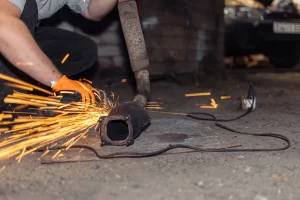Anotation
Catalytic converter theft isn’t just an inconvenience—it’s a growing, costly problem hitting drivers and businesses across the world. As the price of precious metals soars, thieves see an opportunity under your car. But you can take smart steps to protect your vehicle, your wallet, and the planet.
Catalytic converter theft isn’t just an inconvenience—it’s a growing, costly problem hitting drivers and businesses across the world. As the price of precious metals soars, thieves see an opportunity under your car. But you can take smart steps to protect your vehicle, your wallet, and the planet.
Why Thieves Want Your Catalytic Converter
Catalytic converters reduce harmful emissions from your car’s exhaust system, playing a critical role in cleaner air by converting pollutants into less harmful gases. Inside each converter are small but valuable amounts of palladium, platinum, and rhodium, with rhodium prices having peaked at over $20,000 per ounce (USGS). According to the International Resource Panel, recycling these metals not only conserves critical resources but also significantly reduces greenhouse gas emissions, making catalytic converters essential for both environmental and resource sustainability.
A thief can steal a converter in under two minutes using a portable saw, causing thousands in damage for just a few grams of metal. SUVs and trucks are especially vulnerable because their higher ground clearance makes the converter easier to reach.
The Real Cost of Converter Theft
Replacing a stolen catalytic converter can cost €1,000–€3,000, not including the damage to the exhaust system or lost business if your fleet vehicle is off the road. Thieves often hit multiple vehicles in one location, leaving small businesses scrambling to replace or repair their vans.
Worse, the crime often goes unnoticed until you start your car, only to be greeted by a deafening roar from your exhaust system.
A Growing Problem Worldwide
Catalytic converter thefts spiked during the COVID-19 pandemic as car usage dropped and metal prices surged. Even now, the problem is escalating globally. According to Europol, organized crime groups are behind large-scale catalytic converter thefts, moving stolen converters across borders for illegal recycling.
Why Recycling Catalytic Converters Matters
Here’s something you may not know: catalytic converter recycling saves enough water to fill a small football stadium, equivalent to around 2 million liters of water saved in mining and production (EPA). Recycling also reduces energy use by up to 90% compared to mining virgin metals.
While theft is illegal and harmful, ethical catalytic converter recycling of end-of-life converters is a powerful environmental win. When your converter reaches its natural end, catalytic converter recycling helps reduce emissions and conserves critical resources.
How to Prevent Catalytic Converter Theft
While no method guarantees 100% protection, these strategies significantly reduce your risk:
Park Smart
Park in well-lit, secure areas.
Use garages or fenced locations for overnight parking.
If parking in public, place your vehicle near walls or between other low-clearance vehicles to limit access.
Use Physical Deterrents
Install converter cages or steel shields.
Use Kevlar straps designed to resist cutting.
Etch your vehicle’s VIN on the converter, making resale to scrapyards difficult and illegal for thieves.
Leverage Technology
Motion-sensitive lights and alarms deter thieves.
Security cameras can capture evidence and deter repeat targeting.
Check Your Insurance
Not all auto insurance policies cover catalytic converter theft by default. Confirm your policy covers it or consider adding comprehensive coverage to reduce out-of-pocket replacement costs.
Raise Awareness in Your Community
Many thefts occur in clusters. By educating your neighbors or business community, you create a collective deterrent. Share this article with your team or network to help others stay ahead of the problem.
The Bottom Line

Catalytic converters play a vital role in reducing emissions, but their hidden value also attracts crime. By taking proactive steps—securing your vehicle, installing protective measures, and focusing on catalytic converter recycling through trusted catalytic converter buyers—you protect your wallet, your vehicle, and the environment while securing a fair catalytic converter scrap price when your converter reaches its end of life.
Every converter recycled ethically reduces emissions, conserves critical metals, and saves millions of liters of water. Let’s keep our roads quiet, our air clean, and our cars safe.
Frequently Asked Questions
1. Why are catalytic converters targeted by thieves?
Catalytic converters contain precious metals like palladium, platinum, and rhodium, making them attractive to thieves. Because they are easy to remove, many see them as quick cash, which is why protecting your car and planning for catalytic converter recycling when it reaches end of life is essential.
2. How can I protect my car from catalytic converter theft?
You can reduce theft risk by parking in secure, well-lit areas, installing protective shields, using alarms, and etching your VIN onto the converter. Taking these steps helps protect your vehicle until you’re ready for catalytic converter recycling through trusted catalytic converter buyers.
3.What is catalytic converter recycling and why does it matter?
Catalytic converter recycling recovers valuable metals from used converters, reducing the need for new mining while lowering emissions and energy use. It is an environmentally responsible way to handle your converter while ensuring you receive the best catalytic converter scrap price.
4. How much does it cost to replace a stolen catalytic converter?
Replacing a stolen catalytic converter can cost between €1,000 and €3,000, excluding potential exhaust system damage or business downtime. Recycling your old converter through reputable catalytic converter buyers helps offset costs when you upgrade or replace your vehicle.
5. Can Blancomet help with catalytic converter recycling?
Yes, Blancomet specializes in catalytic converter recycling, ensuring precious metals are recovered responsibly while you receive a fair catalytic converter scrap price. As trusted catalytic converter buyers, Blancomet helps you recycle your converter ethically while supporting your wallet and the environment.
